- Home
- Jane Smiley
Saddles & Secrets (An Ellen & Ned Book) Page 9
Saddles & Secrets (An Ellen & Ned Book) Read online
Page 9
When Dad got home Thursday night, I did not know whether he knew that I knew. I didn’t say anything to him, either.
One problem with talking all the time, even times when you don’t realize you are talking, is that people don’t really know what you want. You have said so many things that maybe they are confused, or maybe they don’t believe you. Maybe that’s why Melanie gets to do whatever she wants—she hardly ever says what she wants, so her parents are just glad that she wants something. Melanie is an only child, like I was before Joan Ariel was adopted, but I’ve gone the other way—I make sure they know every single thing that I want when I want it, and also when I don’t want it any longer.
On Saturday, I decided to try something. Dad was in a pretty good mood—he’d already started on his second cup of coffee, and Joan Ariel had slept through the night and eaten a tiny bit of mashed egg for breakfast, which made everyone happy. The first thing I said, as we were backing out of our driveway, was, “I think I want to go to the Grand National.”
Dad said, “That would be fun.”
“I think I want to ride in the Grand National.”
“Maybe someday they will let women do that.” He turned right at the bottom of the street. He sounded like he wasn’t listening.
I said, “I should take ballet lessons.”
“You should.”
“I could learn to do the splits and the backflip.”
“Probably.”
“Or diving. I bet I could do a triple.”
“Eventually.”
“Jimmy Murphy wants to be a racecar driver.”
“I’ll bet.”
“I want to do that, too.”
“Okay.”
“I wonder if you could make racecars jump things.”
“If you had a ramp. But probably not a car. A motorcycle.”
“That sounds like fun.”
“It does.”
Finally, I said, “They should send a horse to the moon.” Even I knew that this was a totally stupid idea.
Dad said, “They should.”
And then we got to the stables. We parked, I got out of the car, and Dad wandered away. I understood right then and there that if you can talk them into everything, then you can’t talk them into anything.
Abby was on a horse that I didn’t recognize when we arrived. She waved, and I watched her for a few minutes in the arena. She was just doing circles. So I went into the barn, went to Tater’s stall, found the halter and lead rope, and started getting him ready for our lesson. He was eating his hay, but he did what he was supposed to do—he lifted his head, let me put on the halter, and followed me out of the stall without even trying to grab a last bite. I took him to the wash rack and cross-tied him. He stood quietly. I brushed him, picked his hooves, took a few tangles out of his mane (I leave the mane combing to Rodney, because you don’t want to pull too many hairs). Finally, I petted him down the nose and looked him in the eye (only one because you can’t look a horse in two eyes—they’re too far apart). I said, “Hey, Tater, maybe you need a friend, too. I don’t really know how to be your friend, but I’ll try.” I didn’t have any sugar or carrots, so I tickled him a little around the eyes and petted his neck.
When I put the saddle on, I was careful to tighten the girth slowly, and when I put the bridle on, I waited for Tater to open his mouth and take the bit, which he did. I made a fist and put it between Tater’s cheek strap and his throat, to make sure that the throatlatch wasn’t too tight, and then I put two fingers between the buckle of his noseband and the back of his head to make sure that that wasn’t too tight, either. I petted him again. When I took the reins and began to lead him out of the barn, I saw Rodney standing there with his hands in his pockets. He said, “Aye, mate, you’ll be puttin’ me out of a job one of these days.” I went over and kissed him on the cheek. No one will ever put Rodney out of a job.
Abby and the new horse were standing outside the barn, and the new horse was staring toward the forest, his ears like antennae, the way that horses always do when they first arrive, but Tater moseyed past him without a look. He did put his ears forward as we approached the arena. I said, “Well, maybe you are looking forward to something.” And as I said it, I decided that I was, too. And so, very softly, I sang a sad song to myself: “As I walked out in the streets of Laredo, as I walked out in Laredo one day, I spied a young cowboy all dressed in white linen….” We walked along on a loose rein, and then, without me asking, Tater went up into a nice trot along the far side of the arena, still on a loose rein, head down, relaxed. I posted, one-two, one-two, and pretty soon I realized that “The Streets of Laredo” isn’t a trotting sort of song. It is three-four time, a cantering sort of song, and a few moments after that, Tater moved up into the canter and I kept singing and he kept cantering. It was an easy canter, still on a loose rein, and I didn’t even see Abby come into the arena. She was standing in the middle when we came down to the walk, with her cowboy hat pushed back on her head. I walked past her, and she said, “That was lovely.”
“I should have warmed up more.”
“Tater is old enough to decide what he wants to do.”
“I think he likes a loose rein.”
“I think he does. Let’s see.” And then we practiced, first at the walk, me holding the reins as lightly as possible, just as if they were silk threads, getting Tater to turn both directions, halt, walk again, turn some more, circle. I could ask him by thinking of what I wanted him to do, or by twitching a finger, or by closing my elbow a little bit, or by looking in the direction I wanted him to go. He was not perfect. He responded best to a little elbow movement, which made it easy for me not to close my hands around the reins and pull. Then we tried everything at the trot. If someone had been looking at us, they would have thought we were just wandering around the arena, but I knew that we were experimenting, and I thought that it was really fun. We trotted and trotted and I sort of lost track of the time. That song was in my head, and eventually it said to me, “Canter,” and so Tater went up into the canter, and we experimented at the canter, too. Abby might have been saying something, but there was a breeze, and anyway, the song was in my mind, so I wouldn’t have heard her, and the next thing that happened was that I sat up and bent my right elbow, and Tater cantered to the right, and just as I was thinking that we were on the left lead, he did a flying change and we were on the right lead, easy as pie, or, maybe, easy as Pie in the Sky. We then kept cantering as if this was no big deal, and at the end of the arena I bent my elbow, sat up straight, and went left, and after three strides, Tater did another flying change and we were cantering to the left. I went once around the arena—maybe Abby was clapping—and then I came down to the walk, walked over to her, and jumped off. I said, “I think we’re finished.”
“Don’t you want to jump?”
I said, “No, I want to think about this forever and ever and ever.”
“Well, walk him around a little bit. I don’t have anything else for another half hour, so if you want to get on again, you can.”
“Do you have a carrot?”
“I have a lump of sugar.”
I held out my hand, then remembered to say please. Tater was looking toward the barn like he didn’t know what on earth a lump of sugar was, but he ate it happily enough once I gave it to him. I loosened his girth, then we walked here and there. Tater wasn’t breathing hard. I petted him sometimes, and I thought about the house we would live in in Pittsburgh, much bigger than our house, and with a big lawn, and my room would be on the second floor, and Tater would live in the backyard, and of course I would ride him to school (which would be a block away), and then, because he’s so smart, I would say, “Okay, Tater, go home and come back at three o’clock,” and Tater would nod, and mosey away. His stall would be right outside the kitchen window, and we would keep the window open when we were eating our din
ner, and Tater’s bucket would sit on the table and he would eat with us.
And yes, I knew that this would never happen, but I knew that it should happen, that if it did happen, I would let all the kids in my school play with Tater, and pet him, and give him treats (but only healthy ones). When I got home from my lesson, I drew a picture of Tater putting his head in the kitchen window and turning it slightly to one side, as if to say, “I’m ready, where are my oats?” and after dinner (I said nothing about this) I went upstairs and fixed my picture a little bit here and there, and then I found a piece of tape and taped it to the back of my door so that when the door was closed, I could look at it. And then I closed the door, because I didn’t want to hear another thing about where we were going and who was going to decide and why the vacuum cleaner business wasn’t good. Was I now friends with Tater? I had to admit that I had no idea what he thought, but that I liked him better than I had liked him before.
Joan Ariel slept through the night again, that was two nights in a row, and when I was sitting at the table eating my cereal, she gobbled down her Pablum like she was starving to death, then ate some applesauce, and after that Mom handed her a zwieback and said, “Look when she opens her mouth. You can see a tiny little tooth popping out.” And I did, and there was.
Then, on Wednesday, at lunch, Melanie and I ate together, but we said absolutely nothing. Halloween was the night before. Grandma surprised me with a Heidi costume. Heidi is a girl in a book, who lives in Switzerland. Grandma loves that book, and I like it, but there are no horses. I trick-or-treated with the Murphys for an hour, but the hills in our town are so steep that I decided it wasn’t worth it. We had already talked a little about Ruthie on Monday and Tuesday, but it seemed like there was nothing else to say, and so Melanie turned into the quiet one and I ate my peanut butter sandwich as if I were hiding in a closet. It didn’t help that Ann and her friends were all getting along and having a wonderful time. After lunch, Melanie went to the playground, but I didn’t follow her. I wandered here and there and tried to listen for some birds or maybe a horse (Ned) whinnying in the distance.
After school, I walked to the market with Jimmy Murphy and Brian and then carried home some of the groceries. I did all my homework, including an extra set of arithmetic problems, and then I fell asleep early, even before Joan Ariel, who I could hear babbling in her crib when I was lying on my bed. I woke up, or at least I think I woke up, and the reason I woke up was that Ned was saying to me in a very soft voice, “Where are you? Where are you? I wish I could talk to you.”
He was under that same tree where he’d always talked to me before, and Gee Whiz was glinting in the moonlight a few yards away, maybe sleeping, because his head was down and his right hind leg was cocked. I thought that was why Ned was whispering, because of course Gee Whiz would be mad if Ned woke him up.
He said it again: “Where are you? Where are you?” And I didn’t dare open my eyes, but I did whisper, “I’m here.”
Ned tossed his head. He looked sleek and beautiful, very grown-up, and maybe he was, since he would soon be five (his birthday is in January).
He said, “There’s a new horse here, and he wants to be the boss. He’s not as big as Gee Whiz, and not as old, but he pins his ears and goes for him every time he sees him. Even Beebop wants to kick him.” Even though Beebop was a bucking horse in the rodeo, he is as nice as can be; however, he is very successful at jumping forward and kicking so high he looks like he is going to flip over. If Beebop wants to kick you, you are in trouble.
I said, “You should stay out of his way.”
“He always runs at you, even if you didn’t do anything. He says there were seven horses where he was before, and he was the boss of all of them.”
“I wonder where he was before.”
“In a desert.” I knew this couldn’t be Arabia, but it did make me think of the Godolphin Arabian.
Now it happened—Ned ran away from where I was talking to him, and another horse, dark and shiny, chased after him, neck stretched out, teeth bared. He looked like that horse I’d seen at the stables. I hadn’t seen much of him, but he had looked okay—pretty, calm.
I lay there with my eyes closed, waiting for Ned to come back, or for Gee Whiz to offer an opinion, and the next thing I knew, it was light, and I was opening my eyes. I was on my side, and the door of my room was against the wall. Mom was in her robe, passing on her way to the bathroom. I pushed back the covers and sat up, looked out my window. Had I really been talking to Ned? Had Ned really been talking to me? Or was it a dream like my National Velvet dream—so vivid that it seemed to be happening, more vivid, in some ways, than most things that do happen?
All spring, I was completely sure that Ned was talking to me. I was nine then. I was in fourth grade. It’s pretty clear when you’re running around on the playground with the kids in fourth grade that they don’t know what they are doing. After Ned stopped talking to me, I partly forgot about it and partly thought that I had made it up and partly decided that Ned was my dream and my way of talking to myself. Now here I was again and I didn’t know.
I went to school. I did all my work. I turned these thoughts over and over in my head and didn’t say anything about them. At lunch, Melanie and I talked about what she was going to do over the weekend—go with her parents to San Francisco, to a play at the Geary Theater, which is very old, and then stay in a fancy hotel. She told me the name of the play, but I didn’t pay attention. We said nothing about Ruthie.
Later, when I was setting the table for dinner, the phone rang. I picked it up, and it was Abby. She said, “Would you like to have an extra lesson at the stables? I’ll be out there tomorrow afternoon. If you could get there right after school, we could work with Blue and Tater the way you did with Tater on Saturday. I really want to try it. I would start on Blue and you would start on Tater, and then we would switch, I hope more than once. I want to see how they deal with it, and I think it would be good for us.”
I said, “I’ll ask Mom. Dad won’t be home, so she would have to drive me.” Mom was now standing in the kitchen doorway. I said, “Can I have an extra lesson with Abby tomorrow afternoon at the stables? You would have to drive me, though.”
Mom was already shaking her head before I even finished talking.
I said, “Or I could call Grandpa. Maybe he could drive me. It’s only to the stables….”
Mom was still shaking her head. And then she said the scariest thing. She said, “We can’t afford an extra lesson. Frankly, I don’t see how we can afford the lessons you’re taking now.”
There was dead silence. Or rather, I was dead silent, and Mom was dead silent, and Joan Ariel wasn’t crying. I thought maybe it was my turn to do that.
After a moment, I realized that Abby was saying, “Ellen? Ellen?”
I put the phone to my ear. She said, “If you can get there, you don’t have to pay. I think it’s training, not a lesson. This is for me, not you. It can be free.” I handed the phone to Mom, took Joan Ariel, and walked out of the room. She was getting heavier, but not as heavy as a saddle. I sat her against the arm of the couch and played patty-cake with her. I am sorry, I think I’m pretty smart, but between you and me, I think Joan Ariel is smarter. Mom walked through the living room and said only one thing, which was, “Okay.” But she still looked sad. I kept playing with Joan Ariel, and Mom seemed better when she came down the stairs again. Grandma and Grandpa showed up for dinner and brought spaghetti and meatballs. The only happy person at the table was six months old.
* * *
—
I didn’t dream about Ned again, or talk to him. When I got to the stables after school (Mom seemed more herself when she picked me up in Grandpa’s car, and without Joan Ariel, so I guess she left her with Grandma), I asked Abby if the horse from last weekend had gone to live with them at the ranch.
“He’s been the
re almost two weeks now.”
“How’s he doing?”
“I like him. He’s very willing.”
“Do you like him better than Gee Whiz?”
“I don’t think so, but they’re all different.”
“Is he turned out?”
“Now he is. He was in for a few days.”
“Is he getting along with the others?”
“Oh, yeah. He’s very easygoing.”
“Nobody’s been hurt?”
“Nope.” Then, “Well, Gee Whiz seemed a little stiff the other day, but he was over it the next morning.”
“No marks?”
“Why are you asking?”
I pretended not to hear her and went to get Tater.
Rodney was nowhere to be found, so I wondered if I had put him out of a job. When I went into the big tack room, though, his things—jacket, cap, boots that he calls “wellies”—were in the corner. I carried Tater’s saddle, pad, and bridle to the wash rack and hung them up. Then I got Tater. I can’t say that he nickered to me, or pricked his ears, or whinnied to me, the way Blue whinnied to Abby, but he did look at me, and then he moved one step toward the stall door as I pushed it open, and I guess that was hello. At any rate, it felt like hello, and of course he was a good boy and put his nose right in the halter. When I cross-tied him on the wash rack, I could see Mom outside, taking a little walk. She paused, put her head back, and took a deep breath, and yes, the piney smell at the stables is very nice.
Once I had him tacked up, I walked him to the front door of the stables, and there was Rodney, sitting on the mounting block, eating something. I said, “What’s that?”
“A scone. A cuppa.”
“What’s a cuppa?”
“Why, miss, don’t you know the proper word for tea?” He was making himself sound so English that I almost could not understand what he was saying. He looked like he was about to laugh. Then he drank the last of his cuppa, wiped his mouth on his sleeve, came over, and tossed me onto Tater. He said, “I make me own scones, miss, and I will keep one for you till after your ride, because they are the best scones in America.”

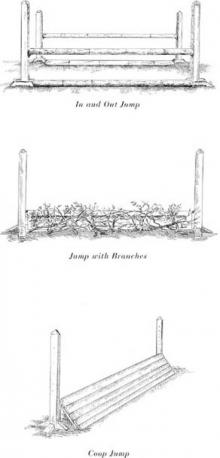 The Georges and the Jewels
The Georges and the Jewels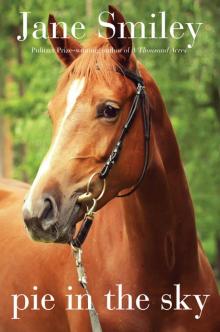 Pie in the Sky: Book Four of the Horses of Oak Valley Ranch
Pie in the Sky: Book Four of the Horses of Oak Valley Ranch Duplicate Keys
Duplicate Keys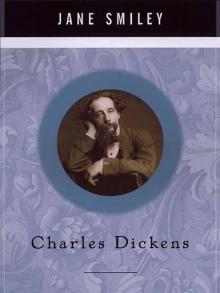 Charles Dickens
Charles Dickens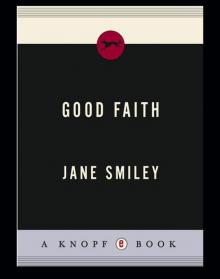 Good Faith
Good Faith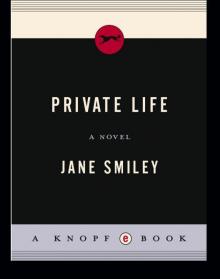 Private Life
Private Life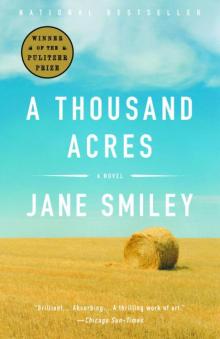 A Thousand Acres: A Novel
A Thousand Acres: A Novel The Greenlanders
The Greenlanders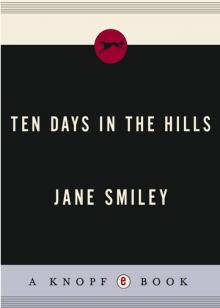 Ten Days in the Hills
Ten Days in the Hills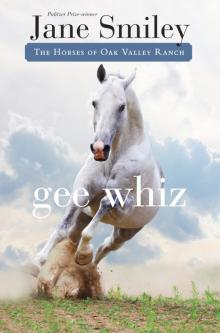 Gee Whiz: Book Five of the Horses of Oak Valley Ranch
Gee Whiz: Book Five of the Horses of Oak Valley Ranch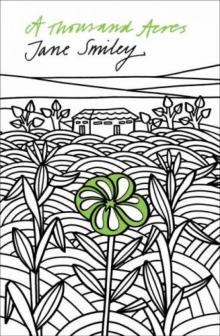 A Thousand Acres
A Thousand Acres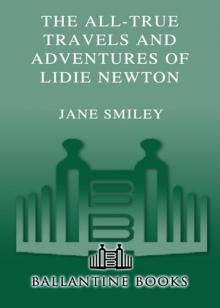 The All-True Travels and Adventures of Lidie Newton
The All-True Travels and Adventures of Lidie Newton Ordinary Love and Good Will
Ordinary Love and Good Will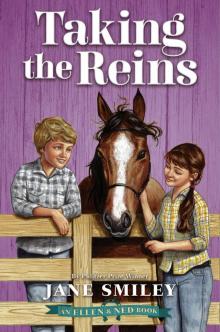 Taking the Reins (An Ellen & Ned Book)
Taking the Reins (An Ellen & Ned Book) The Man Who Invented the Computer
The Man Who Invented the Computer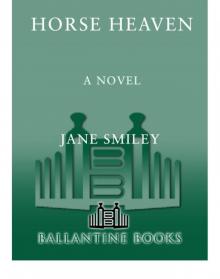 Horse Heaven
Horse Heaven The Age of Grief
The Age of Grief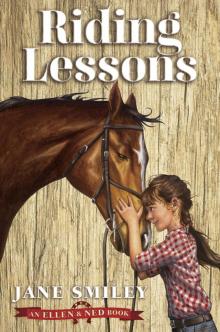 Riding Lessons
Riding Lessons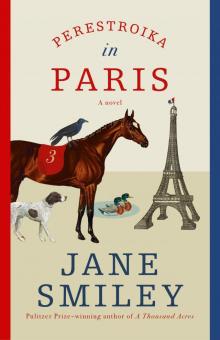 Perestroika in Paris
Perestroika in Paris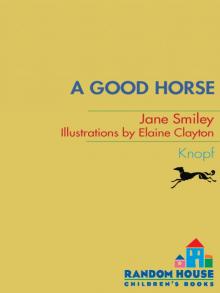 A Good Horse: Book Two of the Horses of Oak Valley Ranch
A Good Horse: Book Two of the Horses of Oak Valley Ranch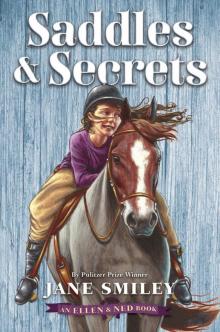 Saddles & Secrets (An Ellen & Ned Book)
Saddles & Secrets (An Ellen & Ned Book)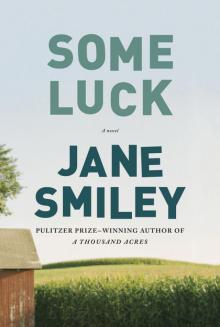 Some Luck: A Novel
Some Luck: A Novel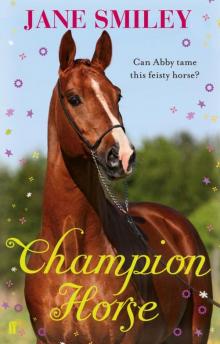 Champion Horse
Champion Horse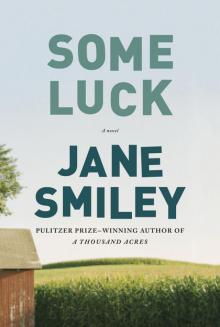 Some Luck
Some Luck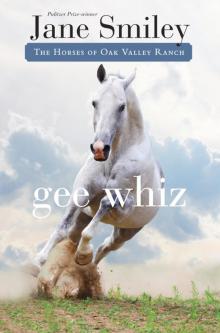 Gee Whiz
Gee Whiz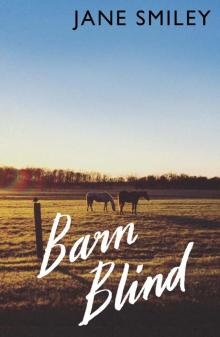 Barn Blind
Barn Blind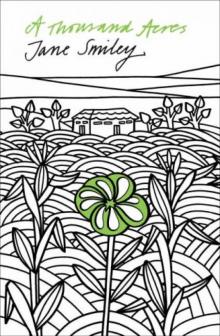 A Thousand Acres (1992 Pulitzer Prize)
A Thousand Acres (1992 Pulitzer Prize)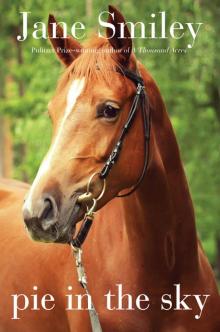 Pie in the Sky
Pie in the Sky True Blue
True Blue A Thousand Acres_A Novel
A Thousand Acres_A Novel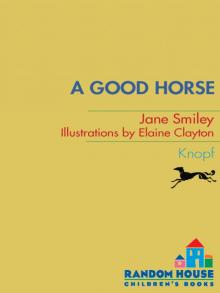 A Good Horse
A Good Horse